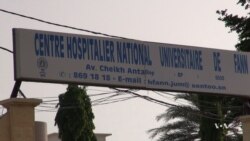Senegal was largely able to avoid last year's Ebola epidemic in West Africa, recording just one case of the deadly virus. But even with the outbreak mostly contained, doctors say the country cannot let down its guard.
At Univeristy Hospital Fann in Dakar, Dr. Moussa Seydi, head of the infectious-diseases unit who treated the country's only Ebola case, said that “it was a tense moment with a lot of work, but it wasn’t complicated to handle the situation because of the willingness for the team to mobilize all efforts.”
Seydi also said the country needs to remain on alert.
"There are a few failures since we solved the first case," Seydi said. "You'll see that basic sanitary measures are being neglected. People used to wash their hands regularly and avoided certain acts, but now people are behaving like there's never been an Ebola case here.”
For that reason, Senegalese officials will start a new campaign to remind people about the dangers of Ebola, Health Minister Awa Marie Coll Seck told VOA recently.
"We want people to always be careful and to think that it’s not over," she said. "They need to take care of themselves — how they are behaving for hygiene, and also all the nutrition. It’s not something we do a lot in Senegal, but in the south you have some people who are eating some wild animals.”
Seck said training shouldn’t stop. “It’s why recently we’ve created an alert which was false to see how people would react. All these have been done in Kolda and Tambacounda, two regions of Senegal. ... Sometimes we are just creating a situation for people to learn by doing."
She noted the country spent about $3.5 million (2 billion CFA) of Senegalese and foreign donor money in Ebola-prevention efforts — and that was with only one case of the virus.
Dr. Alioune Badara Ly, co-coordinator of COUS (Centre des operations d’urgence sanitaire) — an emergency response center funded by the Senegalese Health Ministry, the U.S. Centers for Disease Control and the Bill and Melinda Gates Foundation — said the CDC's help "came in many forms. First, it helped with training about 50 health workers with basic epidemiology lessons. CDC is also helping train a few of our doctors in field epidemiology.”
“The general global health security agenda put together by USAID, CDC and DTRA [Defense Threat Reduction Agency of the U.S. Department of Defense] will build another center for emergency response located at the Fann hospital any day now,” he added.
Beyond Ebola, Ly said the country wants to make sure the emergency response center has a more integrated surveillance system for diseases in human and animals, and fully equipped laboratories.
Meanwhile, at the Fann hospital, vaccines against Ebola developed by British pharmaceutical company GlaxoSmithKline are being used on a trial basis. The unit that was set aside for Ebola cases has been reopened for regular use. But Seydi said they can set up an emergency response center with tents within 24 hours.





